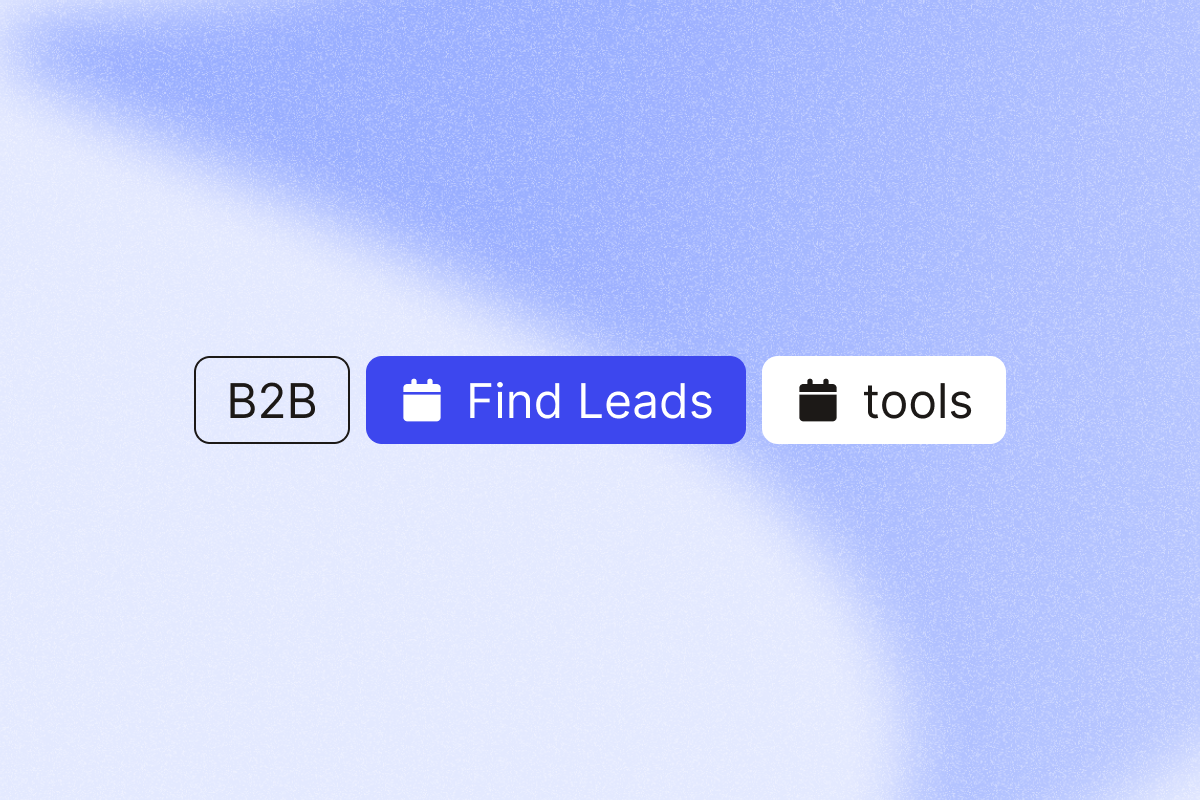Are you considering using a LinkedIn scraper? High-quality data at your fingertips will make your outreach campaigns even more effective.
Here’s everything you need to know to start scraping LinkedIn profiles.
TL;DR
- LinkedIn doesn’t allow unauthorized scraping, but you can still scrape publicly available data if you follow best practices.
- To scrape LinkedIn data without being blocked, start slow, warm up your account, and respect daily and weekly limits.
- LinkedIn has different limits for actions depending on the account type.
- You can scrape profiles, group members, post interactions, company profiles, and event attendees.
LinkedIn scraping steps:
- Choose a LinkedIn automation tool like PhantomBuster.
- Select LinkedIn profiles to scrape from individual LinkedIn profile URLs, lists, or CRM integrations.
- Connect your LinkedIn session cookie so that the tool can act on your behalf.
- Set up email discovery or use built-in options.
- Configure scraper behavior: start with lower limits and increase gradually.
- Set launch frequency to decide how often to run the scraper.
Does LinkedIn allow scraping data?
LinkedIn doesn’t allow unauthorized scraping—it’s against their Terms of Service. But here’s the good news: you can still scrape publicly available data.
If you do it right and follow best practices, scraping LinkedIn data is okay.
How do I scrape LinkedIn data without being blocked?
Want to scrape LinkedIn data without being blocked? The best thing to do is to start slow and gradually increase your activity.
Warming up your account is key because tools perform actions on your behalf, so it’s less risky to have your LinkedIn account restricted.
Plus, exceeding LinkedIn’s limits can also get you flagged. Make sure you stay within the daily and weekly limits for connections, messages, and other activities to keep your account safe.
Here is a starter list of factors that will have an impact on your own unique rate limits:
➟ Whether you have a free or paid account
➟ Date of profile creation
➟ Completeness of the profile
➟ Number of connections/followers
➟ Time spent per day on LinkedIn
➟ Number of messages sent per day
➟ Amount of pending invitations (less is better)
➟ How many articles and publications you’re posting
➟ How many comments or likes you’re giving
Basically, the more you give LinkedIn what it wants, the more it rewards you with visibility and access to features.
A new account without connections, education, or work history can’t send as many connection requests as an older, more active account.
What is the limit of LinkedIn scraping?
First off, LinkedIn doesn’t allow scraping tools. But it does have limits for different actions.
So, when you automate, keep these limits in mind to avoid getting flagged.
When it comes to LinkedIn data scraping, here are some examples:
Profile page extractions:
- New accounts: 80 profiles over 8 launches.
- Active free accounts: 150 profiles over 10 launches.
- Premium accounts: 300 profiles over 20 launches.
Search result extractions:
- New accounts: 100 pages/1000 results per day over 5 launches.
- Active free accounts: 150 pages/1500 results per day over 7 launches.
- Premium accounts: 200 pages/5000 results per day over 10 launches.
Stick to these limits to stay safe!
What data can you scrape from LinkedIn in bulk?
Well, you can scrape almost every piece of publicly available information about any business or LinkedIn user. This is especially useful for building targeted lists and finding leads.
Here are some key examples:
- Lists of people: LinkedIn profiles with names, job titles, and more.
- Group members: Profiles from LinkedIn groups.
- Post commenters and likers: Extract data on users commenting on posts or liking them.
- Company profiles: Detailed company information, like website and phone numbers.
- Event attendees: Profiles of users attending specific events.
Just make sure to stick to LinkedIn’s guidelines and use the right web scraping tools.
How to scrape LinkedIn data step-by-step
If you’re thinking about scraping LinkedIn data, we’ve got you covered.
PhantomBuster is one of the tools you can use for this.
Here’s how to dive in and start scraping LinkedIn profiles effortlessly.
Step 1: Choose a LinkedIn automation tool
First things first, let’s pick a LinkedIn automation tool.
For this guide, we’re using PhantomBuster because it offers pre-built automations (Phantoms) that make data scraping easy while remaining compliant.
Plus, PhantomBuster is perfect for scraping valuable data, whether you’re using a free account or LinkedIn Sales Navigator.
We’ll walk through the steps using PhantomBuster, but remember, depending on the tool you choose, there might be different pre-built automations for scraping specific LinkedIn data.
Step 2: Choose LinkedIn profiles to scrape data from
Let’s pick the LinkedIn profiles you want to scrape data from. You’ve got a few options here:
- Individual LinkedIn profiles or spreadsheets: You can enter a single LinkedIn profile URL or upload a spreadsheet containing multiple profile URLs. Pretty handy if you already have a list of profiles you want to target!
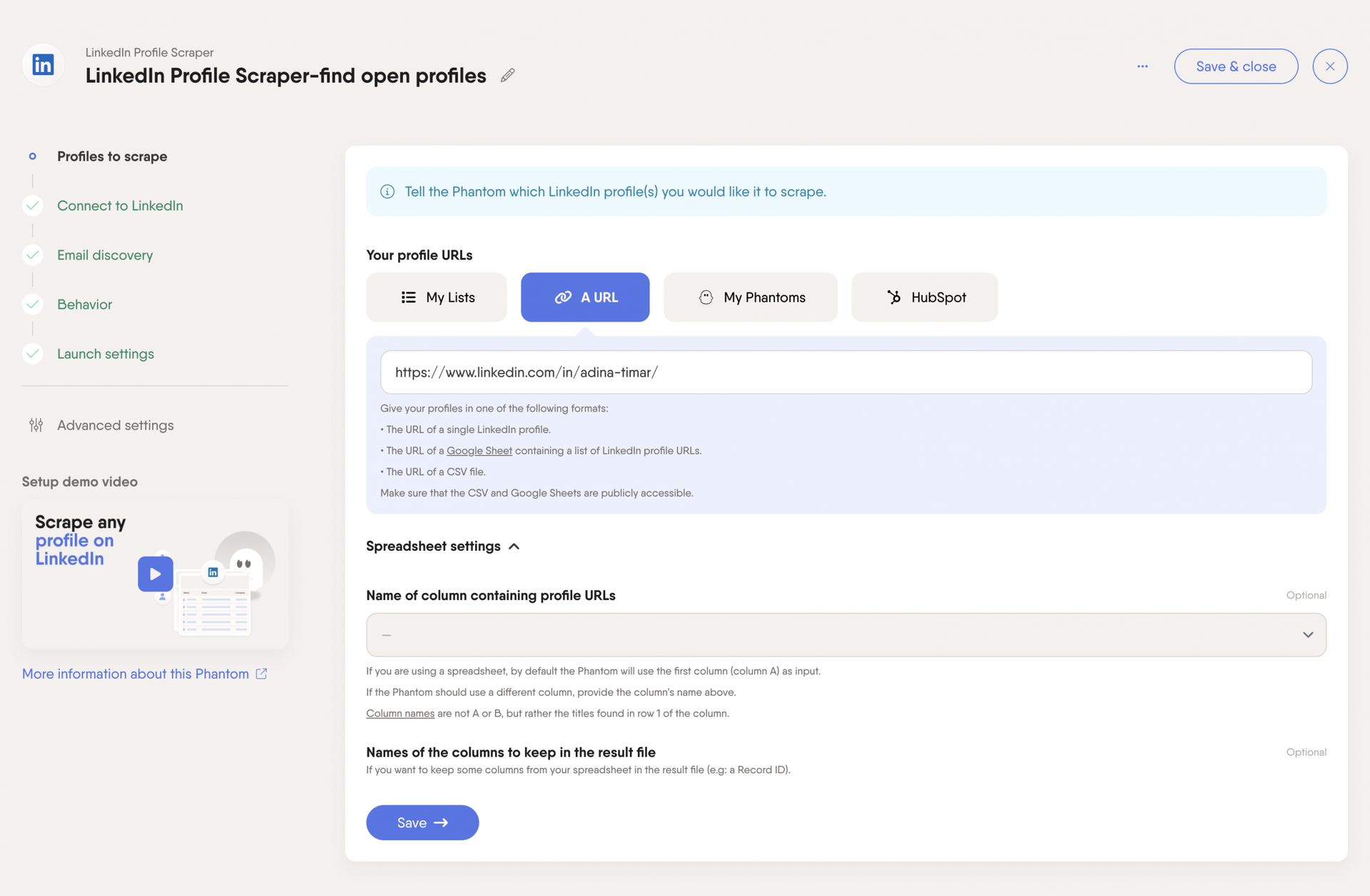
- Saved or existing lists: Use the results from previous Phantoms or a saved list in your PhantomBuster account. You can even create sub-lists based on different criteria to refine your targets.

- HubSpot CRM integration: If you use HubSpot CRM, you can connect your CRM lists directly. This ensures you’re scraping data from your existing contacts efficiently.
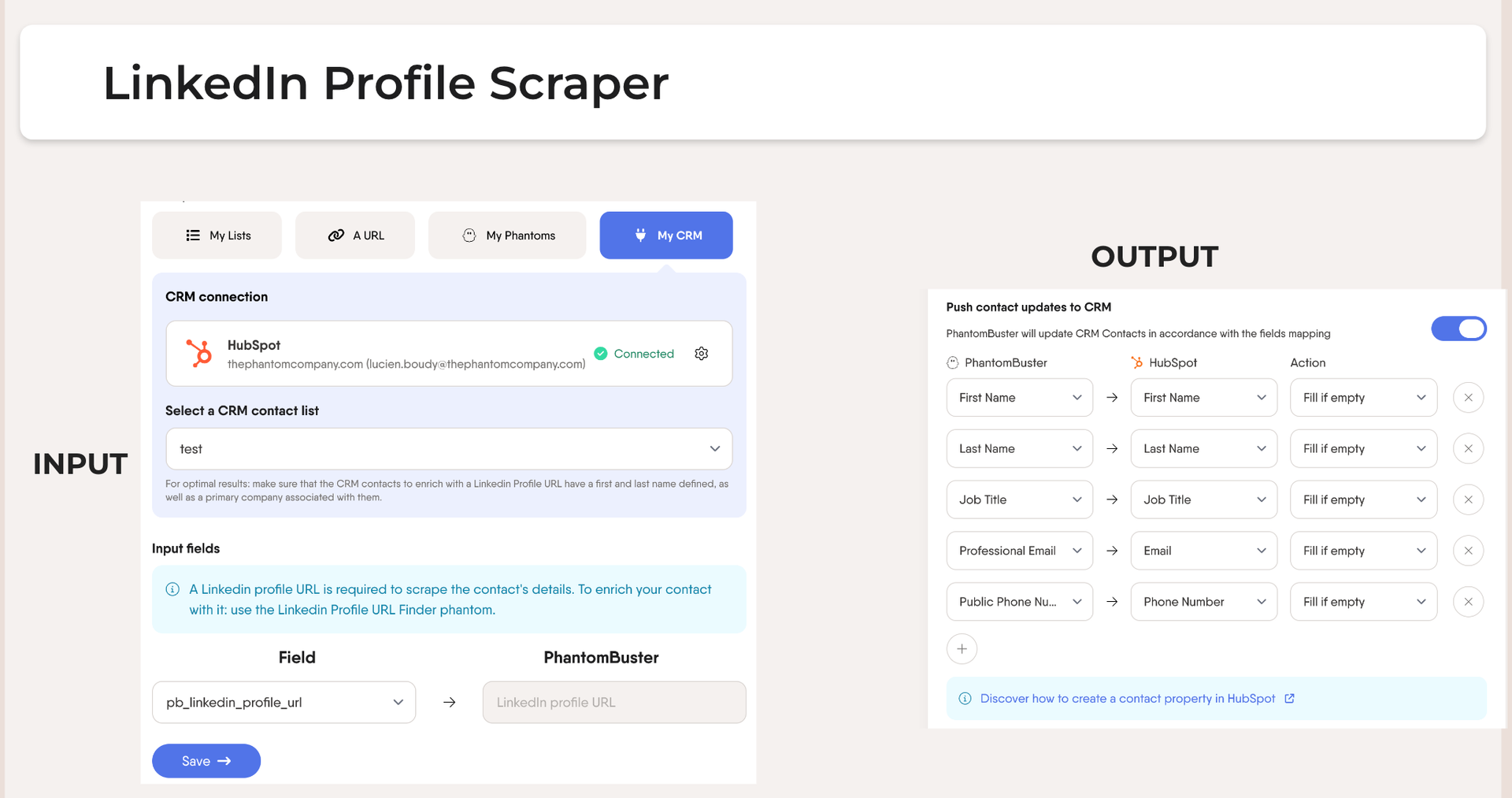
Step 3: Connect your LinkedIn account session cookie
To let PhantomBuster act on your behalf, you’ll need to connect your LinkedIn account.
- Install the PhantomBuster extension: Download it for Chrome or Firefox for easy setup.
- Connect your LinkedIn account: Use the extension to link your LinkedIn account. This will give PhantomBuster the access it needs to scrape data for you.
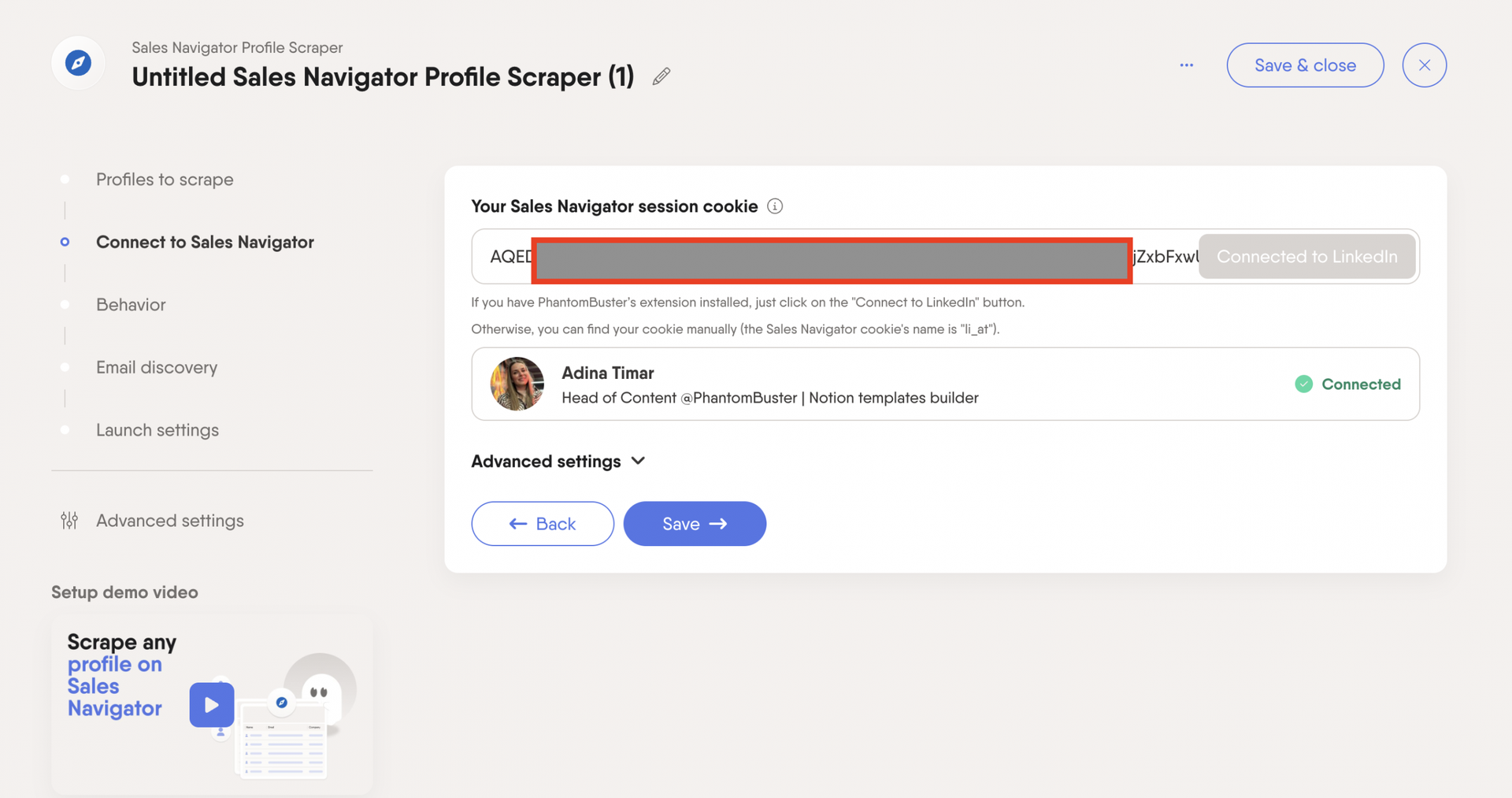
Download the Chrome extension
Download the Firefox extension
Step 4: Choose your email discovery service (or use PhantomBuster)
Now for your email list!
You can either use your PhantomBuster credits or connect your Dropcontact, Hunter, or Snov account to find email addresses for the profiles you’ve scraped.
Just so you know, PhantomBuster comes with monthly email discovery credits that you can use to find verified professional email addresses for your scraped profiles.

Step 5: Set LinkedIn profile scraper behavior
Each LinkedIn account has its own limits. Users of Sales Navigator can run more actions, but these restrictions still apply.
When you’re using tools like PhantomBuster for the first time, it’s essential to start slowly and respect LinkedIn’s limits to avoid restrictions. Gradually increase your automated actions over time.
For instance, start with a smaller number of profiles per launch and increase it as your account warms up.
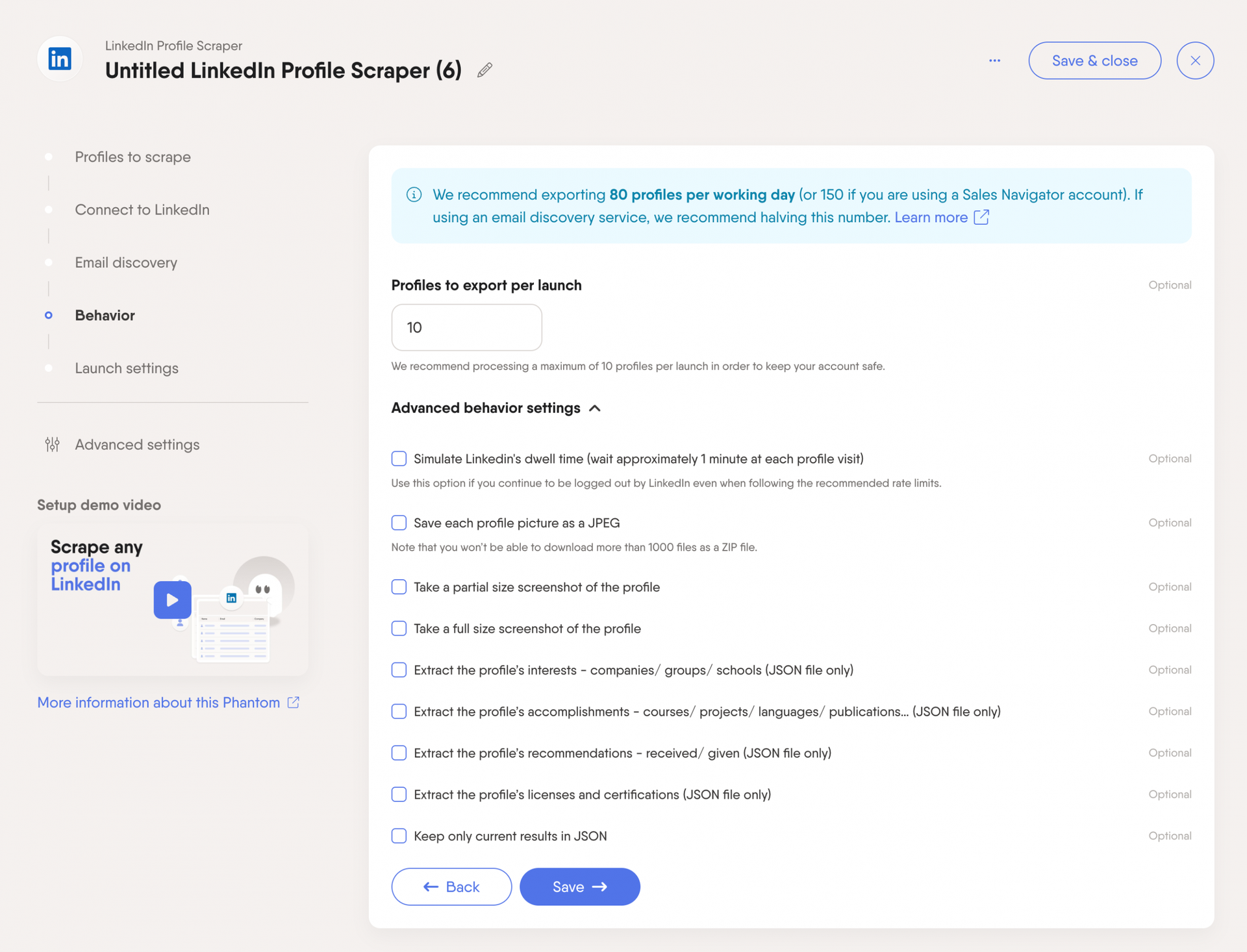
Step 6: Set LinkedIn scraper launch frequency
First, decide how often you want the Phantom to run. To avoid any issues, be mindful of LinkedIn’s limits.
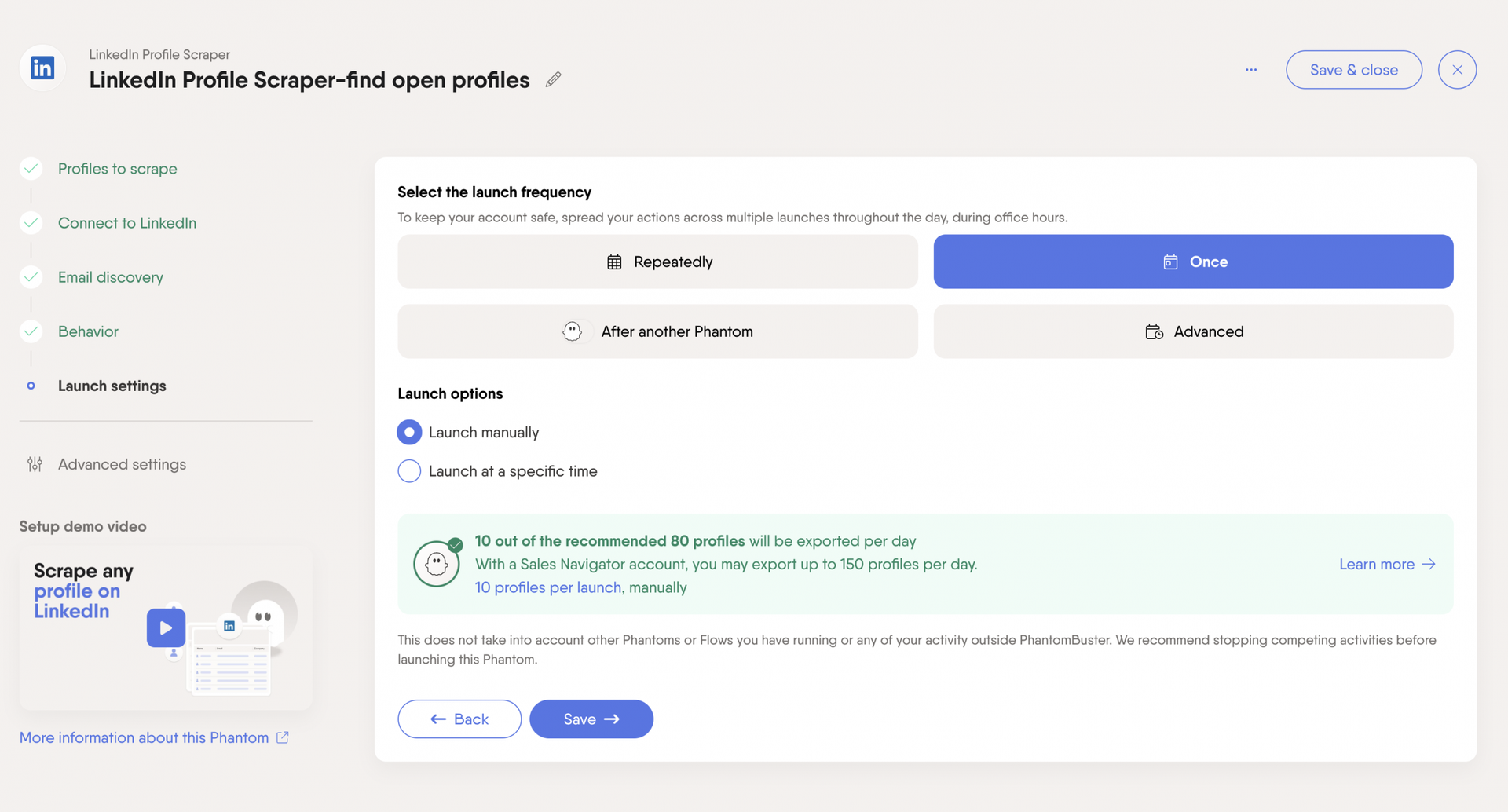
Now, it’s time to launch the Phantom!
You’ll be able to find and verify professional email addresses and gather all available LinkedIn data from each profile.
Step 7 (Optional): Set advanced settings
Here’s where you can fine-tune things.
Set up advanced settings, like proxies, to optimize your resource use and keep everything running smoothly. This helps spread out your activity and avoid getting flagged.
In PhantomBuster, head over to the advanced settings tab.
You can pick PhantomBuster’s built-in proxy or use an external one. Adjust these settings to match your needs and ensure everything operates seamlessly.
It’s a smart move to keep your scraping activity on the down-low.
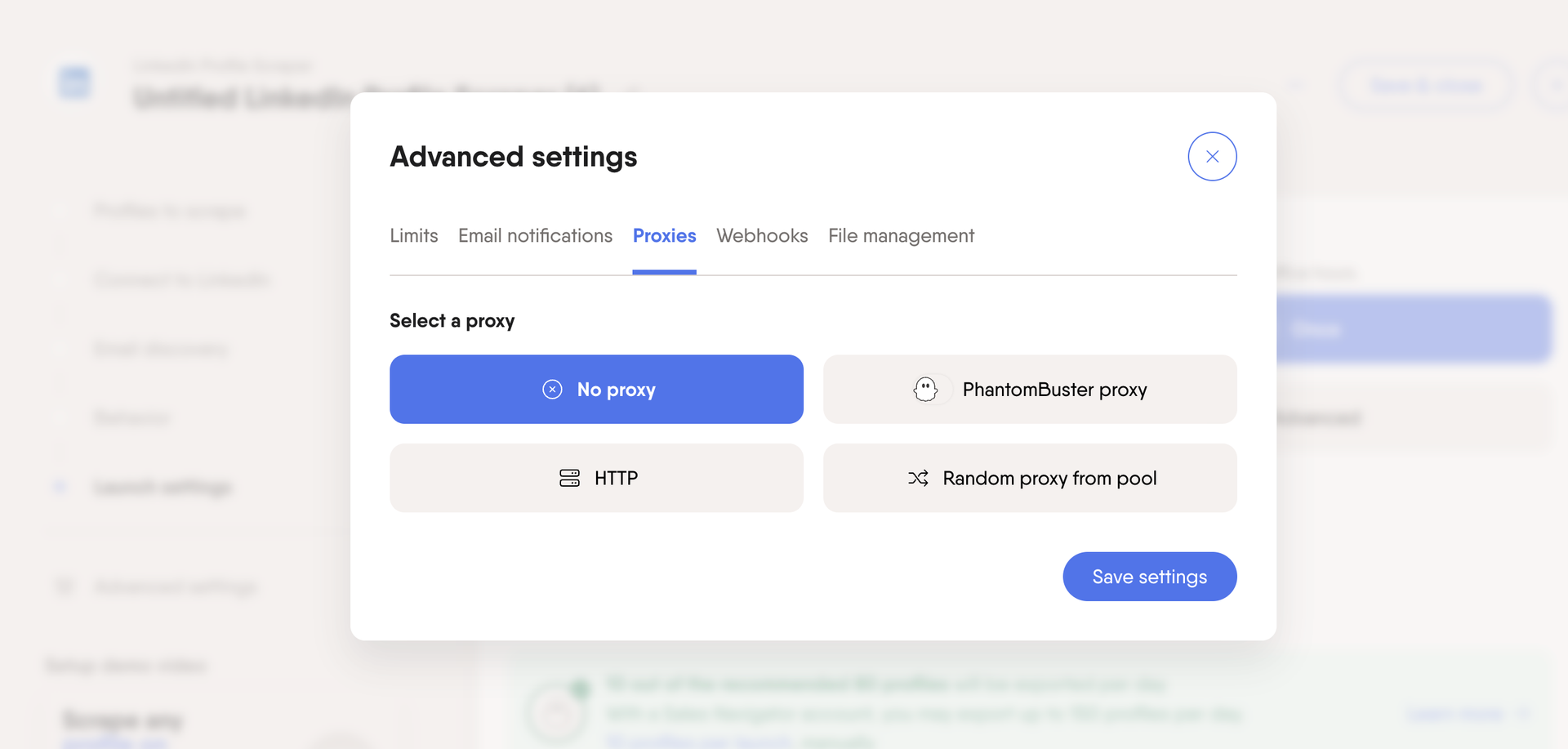
Best LinkedIn scraping tools
If you’re looking to scrape LinkedIn data, the right tools can make a huge difference.
These tools help you collect essential data to boost your lead-generation efforts.
Here are some top LinkedIn scraping tools to consider.
PhantomBuster
PhantomBuster has this awesome LinkedIn scraping automation called the LinkedIn Profile Scraper Phantom (we’ve seen above how to use it).
It pulls public data from profiles, including emails, and gives up to 75 data points, such as education history and current jobs. Perfect for sales and marketing teams!
- Pros: Easy to share which profiles to analyze—you can connect the LinkedIn Profile Scraper Phantom with a list, a search URL, a Google Sheet, or your CRM.
- Cons: If you use the email discovery service, you’ll need to scrape fewer profiles each day to stay within rate limits.
Pricing: After a 14-day free trial, it starts at $56/month for 20 hours of execution time. Discounts are available for annual plans.
Evaboot
Evaboot is a Chrome extension designed for LinkedIn Sales Navigator. It helps you find emails and scrape data directly from Sales Navigator, making it a straightforward tool for gathering leads.
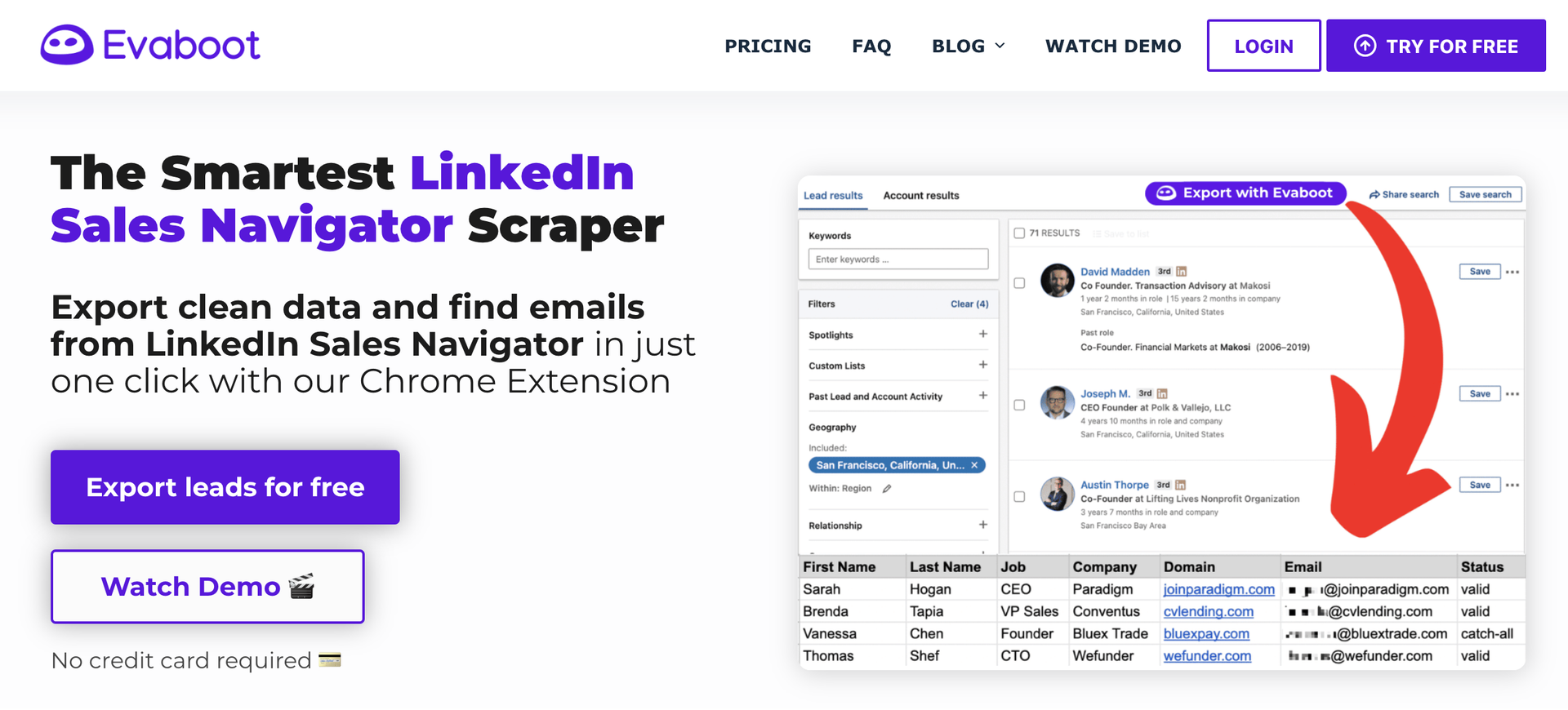
- Pros: You can easily extract LinkedIn profile data and emails straight from Sales Navigator. Plus, the tool is simple to use since it works as a Chrome extension.
- Cons: Some users have noted that the email finder feature isn’t always accurate.
Pricing: Evaboot offers an annual plan for $29 per month, including 500 credits.
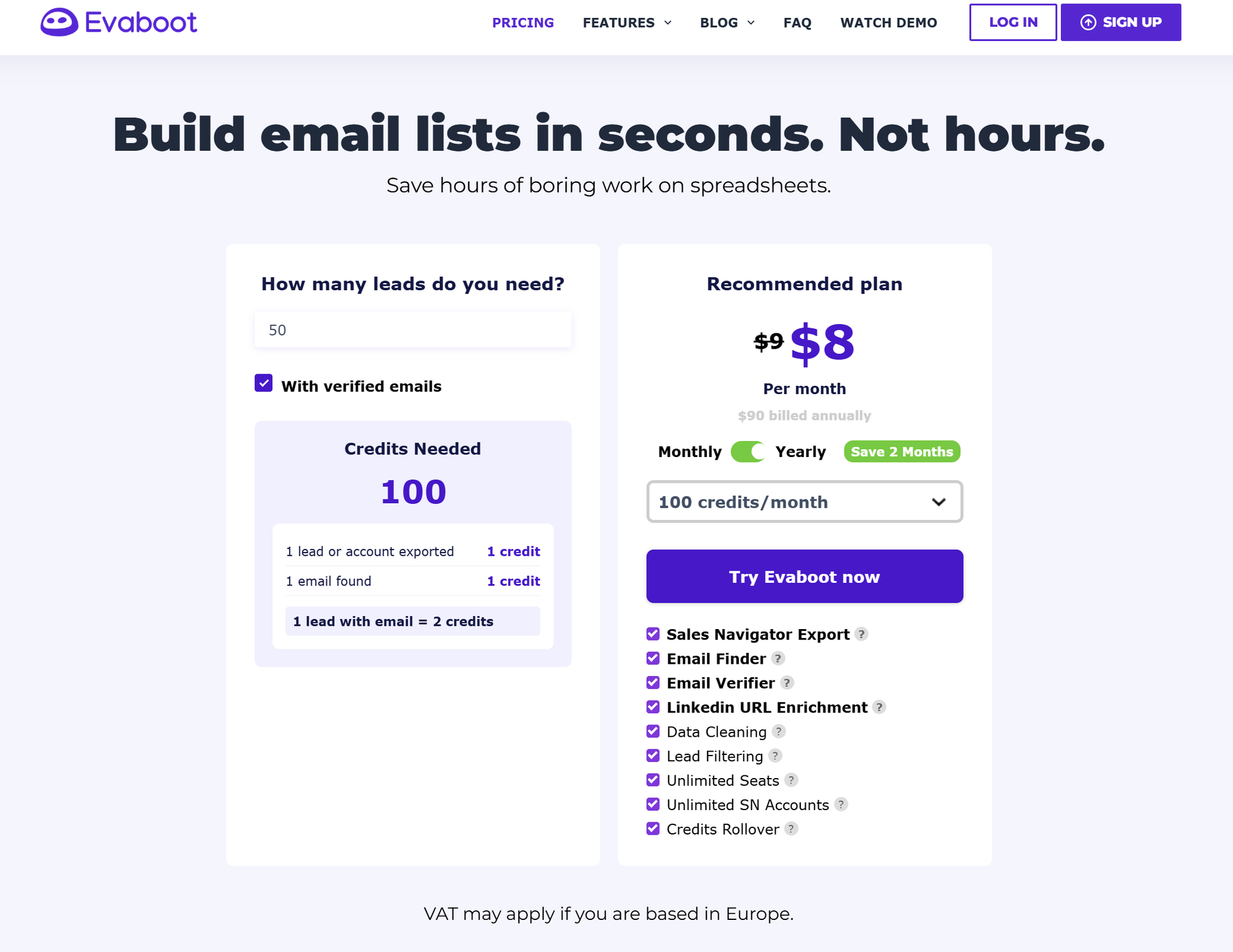
Dux-soup
Dux-Soup is a LinkedIn lead-generation tool that automates tasks like sending messages, viewing profiles, and endorsing skills.
It’s great for connecting with prospects and scraping LinkedIn data efficiently.
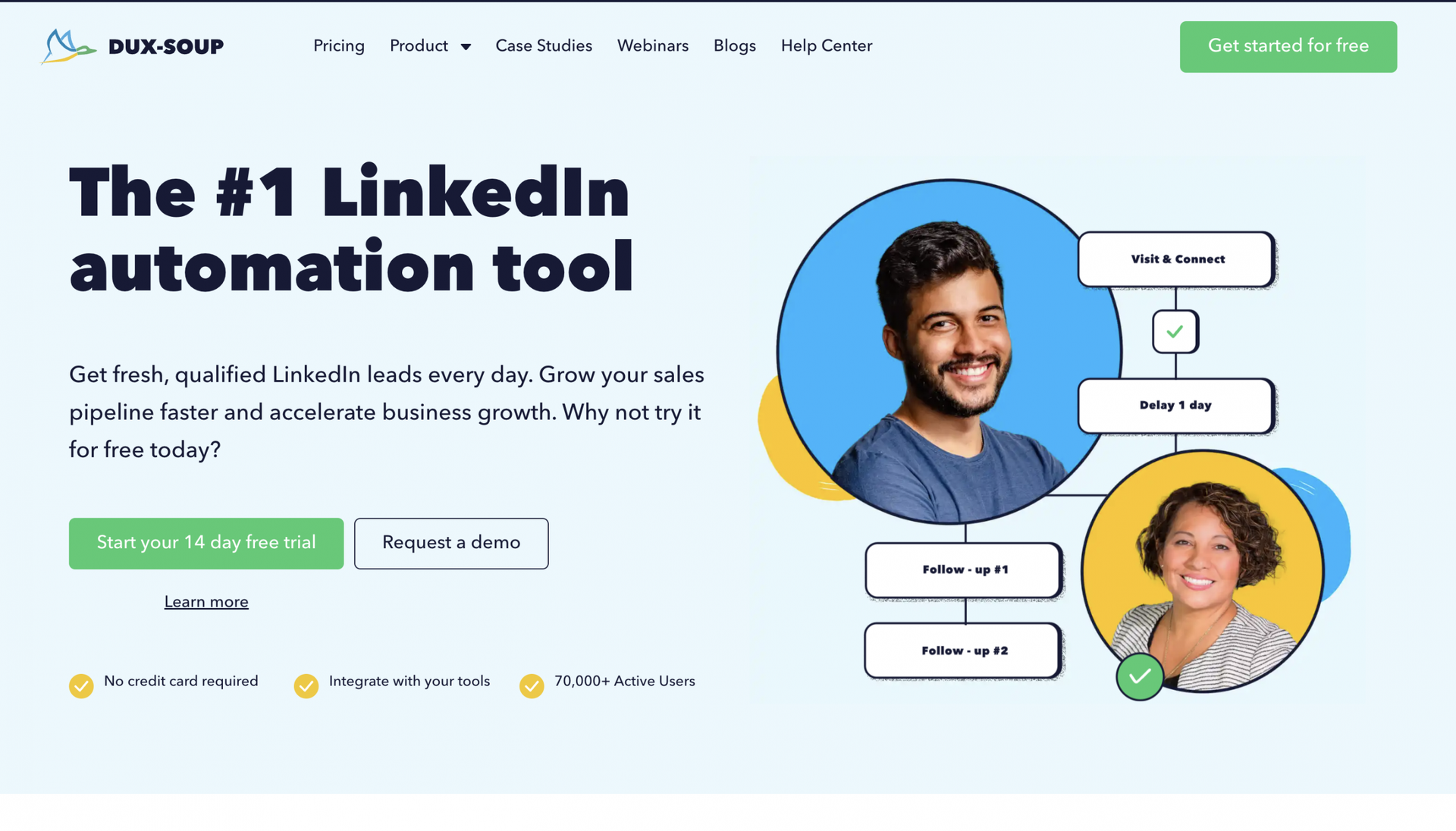
- Pros: Simple to set up and customize, allowing you to manage lead generation projects easily.
- Cons: Requires an extension to run, meaning your computer must be on, which can be inconvenient for off-peak automation.
Pricing: Starts at €12.99 per month for individual users or per seat for team accounts.
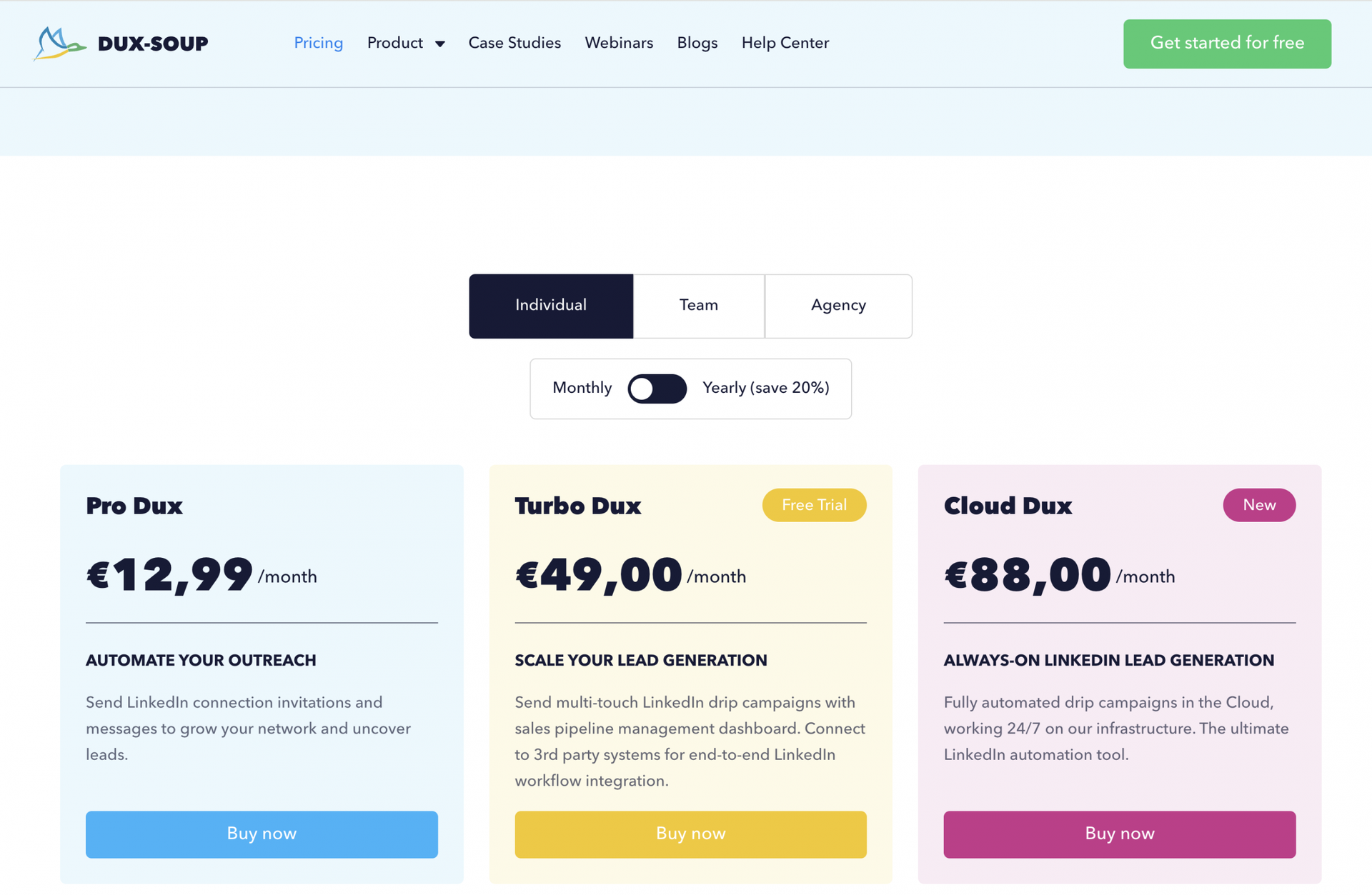
Kaspr
Kaspr is a LinkedIn automation tool that scrapes contact data from LinkedIn profiles and engages with people on autopilot—which is useful for sales and marketing efforts.

- Pros: Seamless integration with LinkedIn using a Chrome extension, allowing quick and easy data collection and lead list building.
- Cons: Some users report inaccurate phone numbers and issues with rate limits. The free version offers limited credits.
Pricing: The free version costs $0 per month. Paid plans start at $65 per month for the Starter plan, with higher tiers available for increased credits and features.
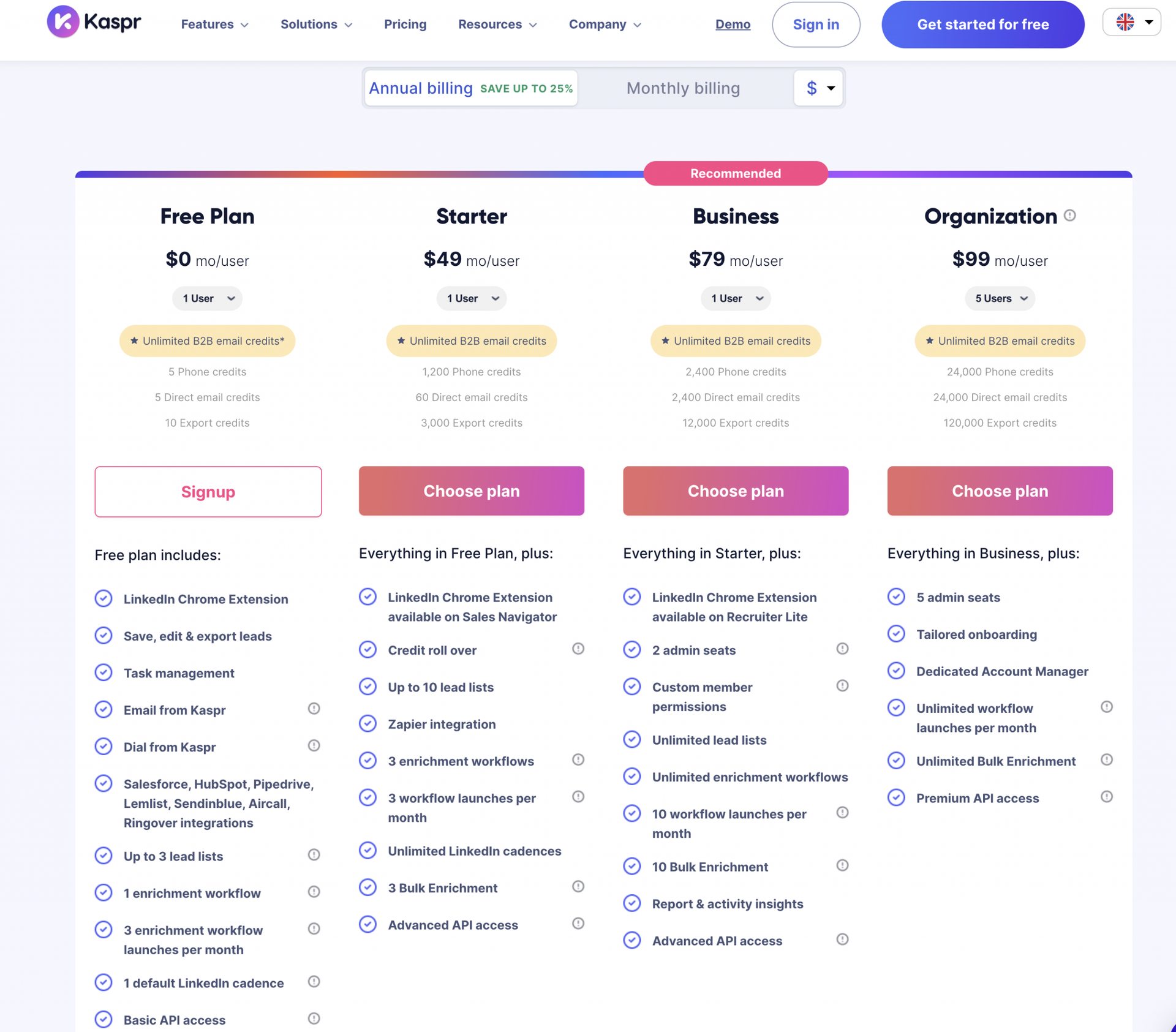
Conclusion
That’s it—the best ways to scrape data from LinkedIn efficiently! Remember to respect LinkedIn’s limits and follow best practices to keep your account safe.
Using LinkedIn scraping, you’ll gain better insights into your leads and competitors, boosting your workflows. Automate your LinkedIn data scraping with PhantomBuster—start your free trial now!
